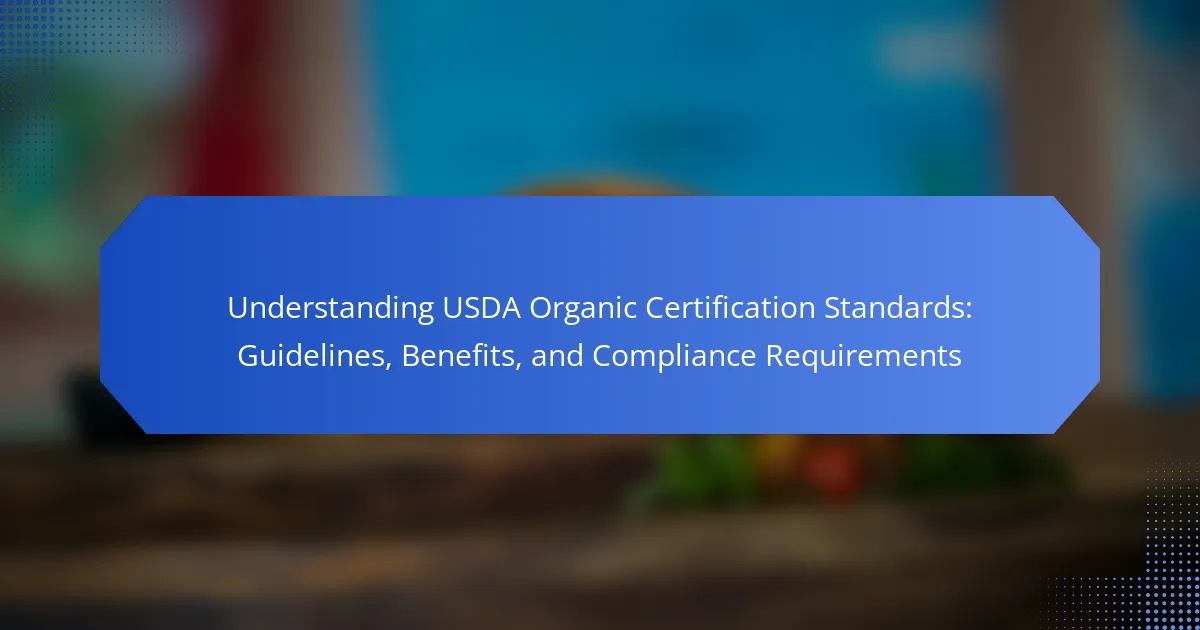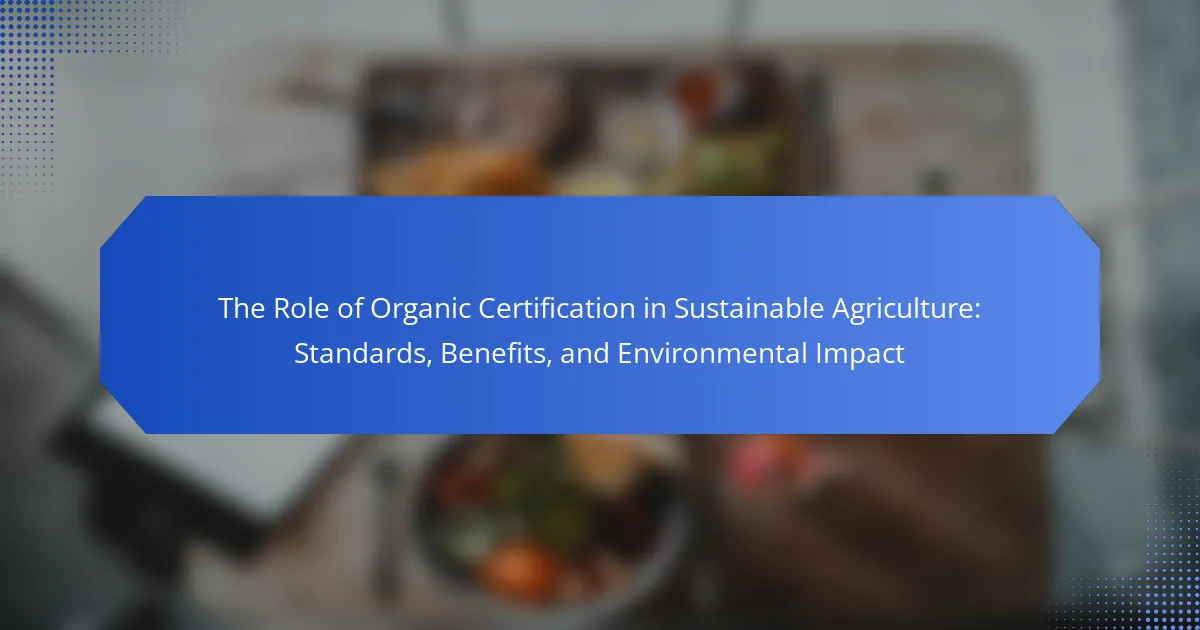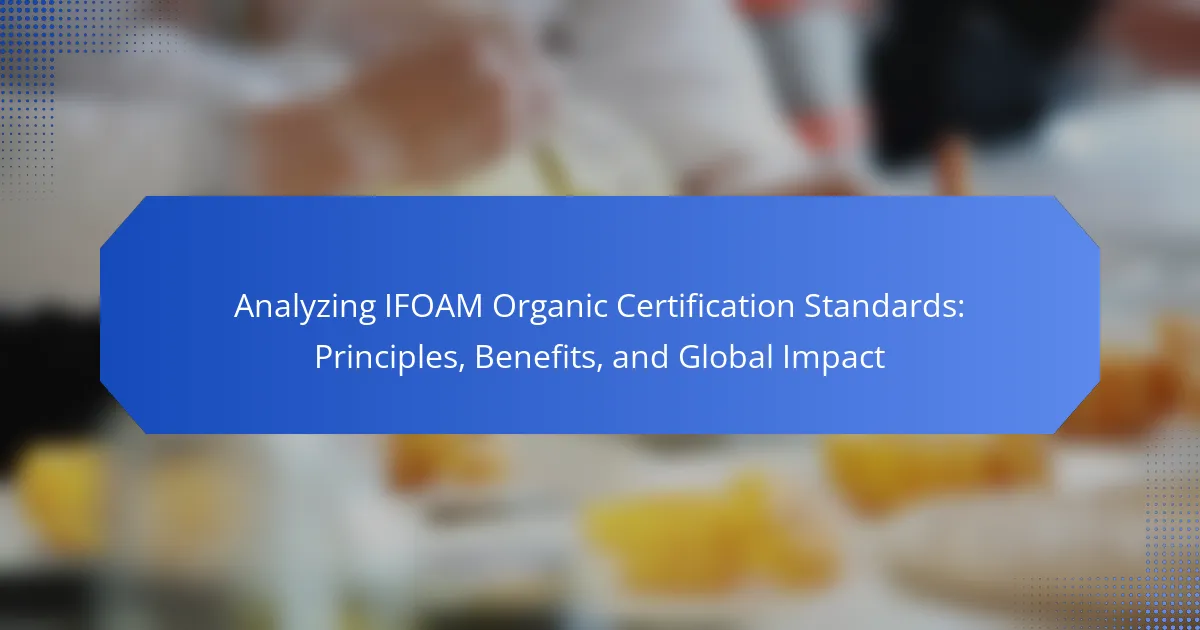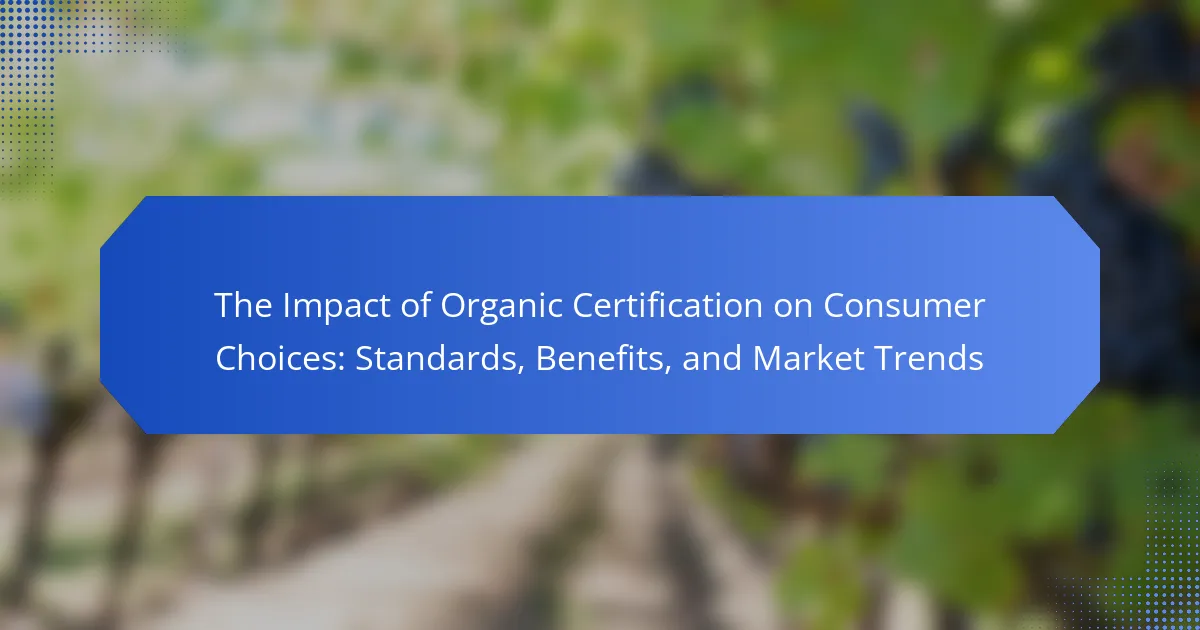Organic certification is a process that verifies agricultural products are produced according to established organic standards, which prohibit synthetic fertilizers, pesticides, and genetically modified organisms. This certification promotes sustainable farming practices, enhances soil health, and supports biodiversity. In the United States, the USDA manages the National Organic Program, which requires farmers to undergo inspections and maintain documentation to demonstrate compliance with organic practices. Achieving organic certification not only allows farmers to market their products as organic but also grants access to premium markets, often resulting in higher prices and increased consumer trust. The article will cover the benefits of organic certification, including market access advantages, compliance best practices, and the importance of maintaining organic integrity for long-term success.

What is Organic Certification for Farmers?
Organic certification for farmers is a process that verifies agricultural products are grown according to specific organic standards. These standards prohibit the use of synthetic fertilizers, pesticides, and genetically modified organisms. Certification ensures that farmers follow sustainable practices that promote soil health and biodiversity. In the United States, the USDA oversees the National Organic Program, which sets these regulations. Farmers must undergo an inspection and provide documentation to prove compliance with organic practices. Successful certification allows farmers to market their products as organic, often resulting in higher prices and access to niche markets. This process supports consumer confidence in the integrity of organic products.
How does Organic Certification benefit farmers?
Organic certification benefits farmers by providing access to premium markets. Certified organic products often command higher prices compared to conventional products. This price premium can significantly increase farmers’ income. Additionally, organic certification enhances marketability. Consumers increasingly prefer organic products for health and environmental reasons. Certification also helps farmers differentiate their products from non-organic competitors. Furthermore, organic farming practices can improve soil health and biodiversity. These practices can lead to long-term sustainability and resilience in farming systems. Research shows that certified organic farms often experience better profitability over time.
What are the key standards for obtaining Organic Certification?
Key standards for obtaining Organic Certification include adherence to specific agricultural practices. These practices emphasize the use of organic seeds and planting stock. Farmers must avoid synthetic fertilizers and pesticides. Crop rotation and biodiversity are essential for soil health. Livestock must be raised without antibiotics or growth hormones. Organic feed must be provided for animals. Additionally, farms must maintain records of practices and inputs. Certification bodies require compliance with the USDA National Organic Program standards.
How do these standards impact farming practices?
Organic certification standards significantly impact farming practices by mandating specific agricultural methods. These standards require farmers to avoid synthetic pesticides and fertilizers. This shift promotes the use of natural alternatives, enhancing soil health. Farmers must also practice crop rotation and biodiversity, which improve ecosystem resilience. Compliance with these standards often leads to better water management practices. Additionally, organic standards encourage reduced tillage, which helps maintain soil structure. Research indicates that farms adhering to these standards often see improved long-term yields. The transition to organic practices can also increase market access and consumer trust.
Why is Organic Certification important in today’s agriculture?
Organic certification is important in today’s agriculture because it establishes trust between consumers and producers. This certification ensures that farming practices meet specific environmental and health standards. It promotes sustainable farming methods that protect biodiversity and soil health. According to the USDA, organic farming can reduce pollution and conserve water. Additionally, organic products often command higher prices in the market. This can lead to increased profitability for certified farmers. The organic market has grown significantly, reaching over $62 billion in sales in the U.S. in 2021. Thus, organic certification is crucial for accessing this expanding market and ensuring consumer confidence.
What are the environmental benefits of Organic Certification?
Organic certification promotes environmentally sustainable farming practices. It reduces synthetic pesticide and fertilizer use. This leads to improved soil health and biodiversity. Organic farms often use crop rotation and cover crops. These methods enhance soil structure and nutrient content. Studies show organic farming can reduce greenhouse gas emissions. Research indicates organic practices can improve water quality by minimizing runoff. Organic certification also encourages habitat preservation for wildlife. Overall, these practices contribute to a healthier ecosystem.
How does Organic Certification affect consumer trust and demand?
Organic certification significantly enhances consumer trust and demand. Consumers perceive certified organic products as healthier and more environmentally friendly. A study by the Organic Trade Association found that 82% of consumers trust organic labels. This trust leads to increased purchasing decisions. Organic certification assures consumers of adherence to strict agricultural standards. Transparency in sourcing and production builds loyalty among consumers. As demand rises, farmers benefit from higher price premiums for organic products. Overall, organic certification plays a crucial role in shaping consumer perceptions and market dynamics.
What support systems are available for farmers seeking Organic Certification?
Farmers seeking Organic Certification have access to various support systems. These include government programs that provide financial assistance and resources. Non-profit organizations also offer guidance and educational workshops. Additionally, local agricultural extension services can assist with compliance and best practices. Certification bodies often provide technical support throughout the certification process. Research shows that farmers who utilize these support systems are more likely to achieve successful certification. The USDA Organic Certification program also outlines specific resources available for farmers.
What resources do farmers have for understanding certification processes?
Farmers have various resources for understanding certification processes. These resources include government agencies, agricultural extension services, and non-profit organizations. The USDA provides guidelines and information on organic certification. Many states offer extension services that provide education and support on certification. Non-profit organizations like the Organic Trade Association offer resources and training. Online platforms also provide webinars and courses on certification. Additionally, farmers can connect with certified peers for firsthand insights. These resources help farmers navigate the complexities of certification effectively.
How can farmers access financial assistance for certification costs?
Farmers can access financial assistance for certification costs through various programs and grants. Many government agencies offer funding specifically for organic certification. The USDA provides cost-share programs that reimburse a percentage of certification expenses. Additionally, non-profit organizations often have grants available for farmers seeking certification. Local agricultural extension services can also provide information on available financial resources. Farmers should research and apply for these programs to alleviate the financial burden of certification costs.

What are the market access advantages of Organic Certification?
Organic Certification provides significant market access advantages for farmers. It allows products to enter premium markets that prioritize organic goods. Retailers often seek certified organic products to meet consumer demand for healthier options. Certified organic products can command higher prices, enhancing farmers’ profitability. Additionally, organic certification can improve brand reputation and consumer trust. Many consumers are willing to pay a premium for certified organic products due to perceived health benefits. The global organic market has been growing steadily, with sales reaching $120 billion in 2019, according to the Research Institute of Organic Agriculture. This trend indicates a growing opportunity for certified organic farmers to expand their market presence.
How does Organic Certification enhance market opportunities for farmers?
Organic Certification enhances market opportunities for farmers by enabling access to premium markets. Certified organic products often command higher prices compared to conventional products. This price differential can significantly increase farmers’ revenue. Additionally, consumers are increasingly seeking organic products, leading to greater demand. Retailers and wholesalers often prefer to stock organic items due to consumer preferences. According to the USDA, organic food sales reached $62 billion in 2020, indicating robust market potential. Furthermore, organic certification can improve farm sustainability and soil health, appealing to environmentally conscious consumers. Overall, the certification aligns farmers with growing market trends, enhancing their competitiveness.
What types of markets are most accessible to certified organic farmers?
Certified organic farmers have access to various markets. These include local farmers’ markets, where consumers seek fresh, organic produce. Additionally, grocery stores increasingly stock organic products, catering to health-conscious shoppers. Restaurants that prioritize farm-to-table practices often source from certified organic farmers. Wholesale distributors also provide a significant market channel for organic products. Online marketplaces have emerged, allowing farmers to reach a broader audience directly. Specialty health food stores focus on organic offerings, further expanding market access. According to the USDA, organic food sales have consistently grown, indicating strong consumer demand. This growth supports the viability of markets accessible to certified organic farmers.
How does Organic Certification influence pricing and profitability?
Organic certification typically leads to higher pricing and improved profitability for farmers. Certified organic products can command premium prices in the market. According to the USDA, organic products often sell for 20-100% more than their conventional counterparts. Higher prices can result in increased revenue, contributing to overall profitability. Additionally, organic certification can enhance market access, allowing farmers to reach niche markets. These markets often have less competition, further supporting profit margins. Studies show that organic farms tend to have lower input costs over time, as they rely on sustainable practices. This cost reduction can also positively impact profitability. Overall, organic certification provides a financial advantage through higher prices and reduced costs.
What are the challenges faced by farmers in obtaining Organic Certification?
Farmers face several challenges in obtaining Organic Certification. The process requires strict adherence to specific agricultural practices. Compliance with these practices can be costly and time-consuming. Farmers must maintain detailed records of their farming activities. This documentation is essential for demonstrating adherence to organic standards. Additionally, transitioning to organic farming often requires a multi-year commitment. During this period, farmers may experience reduced yields and income. Regulatory requirements can also vary by region, complicating the certification process. Lastly, the availability of organic inputs can be limited, impacting farmers’ ability to meet certification standards.
What common obstacles do farmers encounter during the certification process?
Farmers commonly encounter several obstacles during the certification process. One significant challenge is the complexity of regulatory requirements. These requirements vary by region and can be difficult to navigate. Farmers may also face financial constraints. The costs associated with certification can be prohibitive for some. Additionally, the time commitment required for documentation and compliance can be overwhelming. Many farmers lack the necessary knowledge or resources to meet all standards. This can lead to delays in obtaining certification. Furthermore, maintaining organic practices consistently can be challenging due to external factors like pest pressures and market fluctuations. These obstacles can hinder farmers’ ability to achieve and maintain organic certification.
How can farmers overcome these challenges effectively?
Farmers can overcome challenges effectively by adopting organic certification standards. Organic certification provides guidelines that enhance farming practices. These practices improve soil health and biodiversity. Additionally, farmers gain access to new markets through certification. This access can lead to higher prices for organic products. Support from local agricultural organizations can also aid farmers. Training programs help farmers understand organic practices better. Financial assistance may be available to offset certification costs. Overall, organic certification offers a structured approach to addressing farming challenges.

What best practices should farmers follow for successful Organic Certification?
Farmers should follow best practices such as maintaining detailed records of all farming activities. This includes documenting seed sources, inputs used, and harvest yields. They must also adhere to organic standards set by certifying bodies. Crop rotation and the use of cover crops are essential for soil health. Farmers should implement pest management strategies that comply with organic regulations. Regular training on organic practices can enhance compliance. Additionally, establishing a buffer zone from non-organic farms is critical to prevent contamination. These practices ensure farmers meet certification requirements and maintain organic integrity.
How can farmers prepare for the certification process?
Farmers can prepare for the certification process by understanding organic standards and regulations. They should review the National Organic Program (NOP) guidelines which outline specific practices. Documentation of farming practices is essential. Farmers must maintain records of inputs, crop rotations, and pest management. Training on organic practices can enhance compliance. Engaging with certification bodies early can clarify expectations. Farmers should also conduct a self-assessment to identify gaps in their practices. Finally, they can seek support from local agricultural extension services for additional resources.
What documentation is essential for obtaining Organic Certification?
Essential documentation for obtaining Organic Certification includes a completed application form. This form details the applicant’s farming practices and operations. Additionally, a comprehensive organic system plan must be submitted. This plan outlines the methods used to produce organic crops or livestock. Records of inputs, including seeds, fertilizers, and pest control substances, are also required. Documentation of soil management practices and crop rotation plans is necessary. Certificates from suppliers of organic inputs must be included as proof of compliance. Finally, a history of land use for the past three years is needed to ensure no prohibited substances were used. These documents collectively demonstrate adherence to organic standards set by certifying bodies.
How can farmers maintain compliance with organic standards post-certification?
Farmers can maintain compliance with organic standards post-certification by implementing rigorous record-keeping practices. Accurate records of all inputs, practices, and management decisions are essential. Regularly reviewing these records ensures adherence to organic regulations. Farmers should also participate in ongoing training and education on organic practices. This helps them stay updated on any changes in standards. Conducting internal audits can identify potential compliance issues before they arise. Additionally, maintaining communication with certifying agents is crucial for clarifying standards and requirements. Following these steps supports continued certification and fosters consumer trust in organic products.
What tips can farmers use to maximize the benefits of Organic Certification?
Farmers can maximize the benefits of Organic Certification by maintaining meticulous records of their farming practices. This documentation is essential for demonstrating compliance with organic standards. Regularly attending organic farming workshops can enhance their knowledge of best practices. Networking with other certified organic farmers can provide valuable insights and support. Utilizing organic marketing channels can help reach a broader audience. Additionally, farmers should stay updated on regulatory changes to maintain compliance. Research shows that certified organic farms often achieve higher market prices, increasing profitability. According to the USDA, the organic market reached $62 billion in sales in 2020, highlighting the demand for organic products.
How can farmers leverage their certification for marketing purposes?
Farmers can leverage their certification for marketing purposes by promoting their certified status to enhance product credibility. Certification signals compliance with specific standards, attracting health-conscious consumers. It allows farmers to differentiate their products in a competitive market. Certified organic products often command higher prices, increasing profitability. Marketing materials can highlight the certification, emphasizing quality and sustainability. Participation in farmers’ markets and organic trade shows can further showcase certified products. Studies show that consumers are willing to pay a premium for certified organic goods, validating this strategy.
What strategies can enhance consumer engagement for certified organic products?
Effective strategies to enhance consumer engagement for certified organic products include transparent labeling, educational initiatives, and community involvement. Transparent labeling builds trust by providing clear information about product sourcing and certification. Educational initiatives, such as workshops and online content, inform consumers about the benefits of organic farming. Community involvement through local events fosters personal connections between consumers and producers. Research shows that consumers are more likely to engage with brands that demonstrate social responsibility and environmental stewardship. Engaging storytelling about the origins and impact of organic products can also deepen consumer interest and loyalty.
The main entity of the article is Organic Certification for Farmers, which verifies that agricultural products are grown according to specific organic standards that prohibit synthetic fertilizers and pesticides. The article outlines the benefits of organic certification, including access to premium markets, enhanced profitability, and improved farming practices that promote sustainability and biodiversity. It discusses key standards for obtaining certification, the environmental benefits, and the support systems available for farmers. Additionally, it addresses the challenges faced during the certification process and provides best practices for maintaining compliance and maximizing market opportunities.



